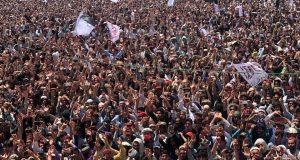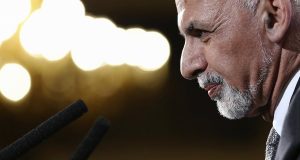During my recent trip to Berlin, I was invited to attend the final leg of the peaceful ‘long march’ campaign which was launched in Dusseldorf on the 16th July 2016, by a group of Baloch activists in an effort to raise awareness and highlight the violation of human rights in Balochistan. Coincidentally, I happened to be in Berlin on the 5th of August 2016,which gave me the opportunity to meet with and interview activists and participants outside the Reichstag (German Parliament) during the final day of the march. The leader of the Baloch Freedom Movement, Harbiyar Marri Baloch, who is the main architect, leader and activist behind the movement, was represented by his nephew Rohail Marri, (pictured with me below).
Rohail gave a passionate speech during the event highlighting the ongoing atrocities taking place in his homeland. The continuous mass murder of Baloch citizens is staggering and incomprehensible: students, poets, workers, farmers, shopkeepers, writers, musicians, doctors, religious scholars, teachers, university professors and political leaders are mercilessly tortured and murdered. He urged that the international community be made aware of these ongoing barbaric atrocities, continuously carried out unhindered, uncensored, in his homeland. He stated that many victims include the most highly educated, dynamic members of Baloch society.
Many of the speakers on the day highlighted the disturbing facts that even senior citizens and children are not spared from Pakistan State brutality and its intelligence contingent. Over 100,000 Baloch people have been made refugees in their own land, over 20,000 people have been kidnapped and disappeared due to the brutal actions of Pakistan security forces. Thousands are abducted, held in torture chambers, shot and then dumped in mass graves, many bodies have been recovered showing clear signs of mutilation and extreme torture, often discovered in desolate locations of Balochistan. Many civilians are still missing and readers may recall the recent ‘long march’ by Baloch citizens to Islamabad in an effort to gain answers regarding the whereabouts of their loved ones. One can only imagine the utter devastation and misery of thousands of families desperately searching and fearing the worst for their beloved family members.
During the event I met with my friend and colleague Claudia Wädlich, whom along with Dr. Richard Benkin, USA and Reza Hossein Borr, founded the NGO ‘Friends of Balochistan’ in London last February. Since then, she has become actively involved in the Balochistan awareness campaign. Claudia, no stranger herself to the horrors of terrorism, is a survivor of the Luxor terrorist attack, carried out by Al Qaida in 1997, where she witnessed the killing of sixty tourists and over one hundred injured people. She studied law at the University of Munster and has also carried out studies in politics, history, literature and art. She has published four books, and furthermore, carried out investigative research into the background of terror attacks, particularly in Iraq and Afghanistan. She thus feels very strongly committed to the plight of Baloch people and is determined to continue the awareness campaign and disseminate knowledge to the broader international community concerning the ongoing atrocities in the region.
It has been made known to this author, through interviews and correspondence, that the historical and political events dating back to the British colonial period and furthermore the present Pakistan State policies towards Balochistan, to be the main evoking factors which have led to the present dismal state of affairs in the region. The British Empire invaded the sovereign state of Balochistan in 1839. Their divide and rule tactics were put in full force by drawing the arbitrary Goldsmid Line in 1871, which was given to the Qajar Dynasty. The Durand geographical border, which partitioned present day Pakhtunkhwa and Balochistan from Afghanistan was drawn in 1893, dividing tribes, their kith and kin. Due to the relentless struggle of Baloch people, Balochistan became independent on August 11th 1947. After the creation of the Pakistan State in 1947, Balochistan became, and I quote: ‘forcefully occupied’ on 27th March 1948, which runs counter to universally accepted notions of the right of freedom of peoples and self-government.’ [1]
The aforementioned report states, under domination, as an occupied state, Balochistan’s economy, society, political, educational and legal institutions have remained underdeveloped, undermining language, culture, art, moral and social values of Balochistan. The report states the rulers manipulate the population, remodelled the region into a military garrison, and furthermore, transformed Balochistan into a haven for ‘imported Jihadists, state backed looters, who remain free to arrest, torture, imprison and kill.’ [2]
Balochistan is rich in natural resources: a strategic geographical link to the East, South Asia, the Middle East and Central Asia, yet my sources state, Balochistan has remained static and occupation has remained an obstacle to economic, social, political and legal development.
The liberation Charter states, they are united in determination to break free and establish independence for Baloch people.
It has further been confirmed that human rights violations and abuses by Pakistan have been acknowledged by the Human Rights Watch, Amnesty International, Human Rights Commission of Pakistan and the Asian Human Rights commission. Similar to the ethnic Pashtun people, the state has embarked on a mission to annihilate history, language and cultural traditions of the Baloch people. Violent fundamentalist groups continue to promote bigotry and violence in the province, and similar to Pakhtunkhwa, the tradition of religious tolerance, values and customs are slowly but steadily becoming exterminated.
Errily, shortly after the successful final phase of the ‘Free Balochistan Movement’ peaceful long march through Germany, the president of the Balochistan Bar Association was assassinated. Furthermore, a suicide bomber was waiting for the many lawyers who congregated at the hospital to pay their respects: most of the murdered, were of Pashtun ethnicity. Since the Quetta massacre many questions and conspiracy theories have flourished. Rumours abound, such as the perceived failure of the Zarb-e-Azb offensive in the FATA, leading to a theory which many believe has resulted in terrorists now setting up shop in Balochistan. Other media sources mention the CPEC project as being a dominant sabotage tactic and reasoning behind the terror attack.
One of the detrimental factors and unfortunate realities resulting in the creation of Pakistan is that four provinces, each with multifarious cultural, linguistic, traditional values and customs were forcefully amalgamated in 1947 under one rule, and against the wishes of many people. The utter carnage that took place during and after the creation of Pakistan and the transitional period remains in living memory as a catastrophic event which damaged the lives of many, furthermore, the loss of life which ensued is still incalculable today.
Under the ‘Balochistan Liberation Charter,’ it is stated that “the illegal occupation of Balochistan has acted as the main obstacle to Balochistan’s economic development. It is the right of the people of Balochistan to determine their own destiny and future. Every Baloch has experienced the indignity of being regarded as a second-class citizen in their own homeland.”[3]
[1] Balochistan Liberation Charter (Proposed Constitution discussed and written by the Baloch Movement, Academics and Professors)
[2] Ibid.
[3] Ibid
Writer: Angelina Merisi

The writer hails from Ireland. She is part of the Pashtuns Times News Network. She is a PhD scholar at the University College Cork, Ireland. Her current research is focused on Islam and Pashtun male migrants in Ireland, masculinity and honour concepts. She can be reached at
merisi3331@gmail.com
THE PASHTUN TIMES
 Pashtun Times Latest News
Pashtun Times Latest News




